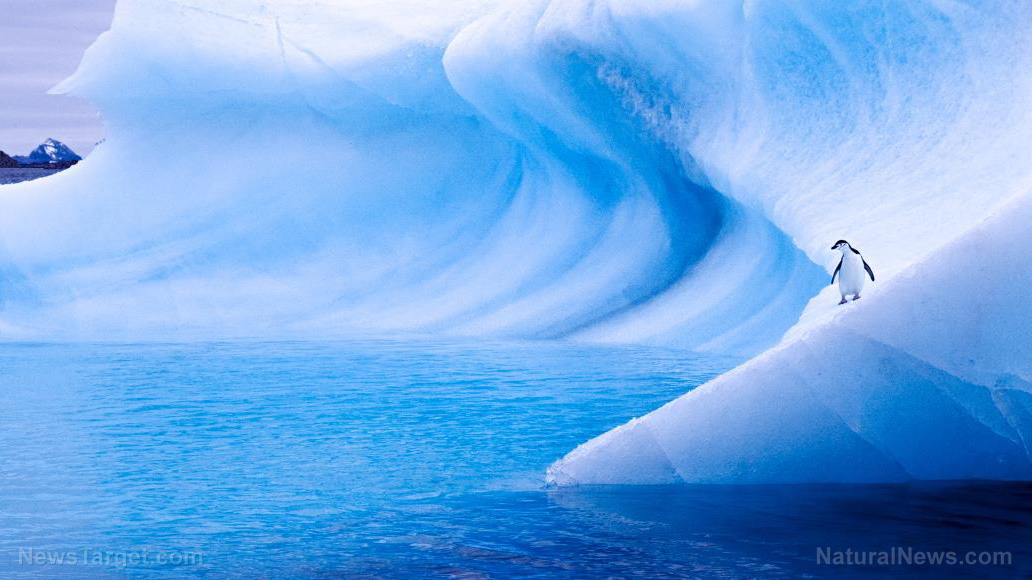Results 1 to 1 of 1
Thread Information
Users Browsing this Thread
There are currently 1 users browsing this thread. (0 members and 1 guests)
-
01-08-2024, 06:31 AM #1
“Melting Antarctic” scare narrative exposed as FRAUDULENT: Antarctic ice MORE stable
“Melting Antarctic” scare narrative exposed as FRAUDULENT: Antarctic ice MORE stable than previously thought
01/07/2024 // Ethan Huff // 3.5K Views
Tags: Antarctica, Climate, climate alarmism, climate change, environ, Fact Check, global warming, goodclimate, goodscience, ICE, real science, research, Study

Mainstream "news" is littered with scare stories about how global warming has apparently gotten so bad that the Antarctic ice shelves are melting. The truth, though, is that Antarctica's ice shelves are actually growing in size.
New research published by Andreasen et al. looks at Antarctic-wide satellite data collected between 2009 and 2019. The data was compiled using Moderate Resolution Imaging Spectroradiometer, or MODIS.
Between the 10-year period analyzed, Andreasen et al. discovered that the Antarctic ice shelf area grew in size by 5305 km2. Eighteen ice shelves did retreated in size somewhat during that time, but 16 others grew larger in terms of their overall area mass.
"Our observations show that Antarctic ice shelves gained 661 Gt of ice mass over the past decade," the researchers noted in their paper.
(Related: When the next "catastrophe" strikes, climate-related or otherwise, Erie County, N.Y., is ready to impose more lockdowns – only "essential workers" with "movement passes" will be allowed to travel.)
Numerous studies confirm: Antarctic ice is doing just fine
Another study published by Banwell et al. that appears in the journal Geophysical Research Letters looked at an even wider range of Antarctic ice data ranging from 1980 through 2021. That study utilized microwave satellite data from the snow model SNOWPACK.
Like the first study, this second one, which was published in 2023, found that the highest meltwater volumes occurred on Antarctica's Peninsula, reaching a peak in 1992 and 1993, as well as in 1994 and 1995. SNOWPACK calculated "a small, but significant, decreasing trend in both annual melt days and meltwater production volume over the 41 years."
Another paper published by Frazer et al. in the journal Nature backs these findings even further. This one explains that while dramatic ice losses are occurring in some areas of Antarctica, including in West Antarctica from Pine Island and the Thwaites glaciers, ice projections for the future cannot be accurately made.
This study, which looked at a time period ranging from 2003 through 2015, identified extensive glacial retreat and acceleration along the Bellinghausen Sea coastline. Conversely, things look rather well on the ice front along the Amundsen Sea.
"Our results provide direct observations that the pace, magnitude and extent of ice destabilization around West Antarctica vary by location, with the Amundsen Sea response most sensitive to interdecadal atmosphere-ocean variability," the authors wrote.
Finally, another paper published by Baico et al., also in 2023, found that over the centuries, Antarctic ice has both thinned and thickened, depending on the time period.
The authors looked at subglacial bedrock cores to discover that the West Antarctic Ice Sheet (WAIS) between the Thwaites and Pope glaciers "was at least 35 m (meters) thinner than present in the past several thousand years and then subsequently thickened."
"A past episode of ice sheet thinning that took place in a similar, although not identical, climate was not irreversible," the paper reads.
"We propose that the past thinning–thickening cycle was due to a glacioisostatic rebound feedback, similar to that invoked as a possible stabilizing mechanism for current grounding line retreat, in which isostatic uplift caused by Early Holocene thinning led to relative sea level fall favoring grounding line advance."
As you can see, the science is not settled on climate change. As we and others have been saying for quite some time now, the climate is always changing. It goes through periods of cooling, followed by periods of warming, followed by periods of cooling – and on and on it goes, regardless of human activity.
"Most of Antarctica has a temperature inversion so more greenhouse gases make those areas colder," a commenter further pointed out.
The latest climate-related news can be found at Climate.news.
Sources for this article include:
NoTricksZone.com
Copernicus.org
NaturalNews.com
Wiley.com
Nature.com
Copernicus.org
“Melting Antarctic” scare narrative exposed as FRAUDULENT: Antarctic ice MORE stable than previously thought – NaturalNews.comIf you're gonna fight, fight like you're the third monkey on the ramp to Noah's Ark... and brother its starting to rain. Join our efforts to Secure America's Borders and End Illegal Immigration by Joining ALIPAC's E-Mail Alerts network (CLICK HERE)
Similar Threads
-
ANTARCTIC CLIMATE LIES WATCH
By Airbornesapper07 in forum Other Topics News and IssuesReplies: 0Last Post: 09-26-2023, 07:46 PM -
Antarctic Sea Ice Has Not Shrunk In 100 Years
By patbrunz in forum Other Topics News and IssuesReplies: 0Last Post: 11-24-2016, 01:41 PM -
Volcanoes to blame for Antarctic thinning
By AirborneSapper7 in forum Other Topics News and IssuesReplies: 1Last Post: 08-15-2014, 12:41 AM -
Antarctic crater linked to ancient die-off
By JohnB2012 in forum Other Topics News and IssuesReplies: 1Last Post: 09-21-2008, 08:57 PM -
Massive volcano beneath Antarctic ice
By AirborneSapper7 in forum Other Topics News and IssuesReplies: 1Last Post: 03-27-2008, 04:42 AM


 LinkBack URL
LinkBack URL About LinkBacks
About LinkBacks




 Reply With Quote
Reply With Quote


72 Hours Till Deadline: Durbin moves on Amnesty
04-28-2024, 02:18 PM in illegal immigration Announcements